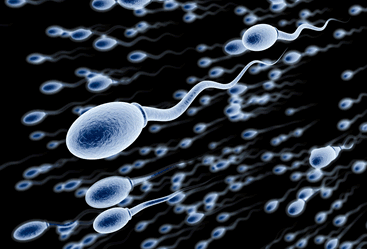African men getting sterile as sperm count declines – Study
 Scientists have found a 72 per cent decline in sperm count in African men over the past 50 years says a study.
Scientists have found a 72 per cent decline in sperm count in African men over the past 50 years says a study.
It was published in the African Health Sciences, June 2017 issue, made available to the Ghana News Agency.
Dr Pallav Sengupta, the Head of Physiology Unit, Faculty of Medicine, Lincoln University College, Malaysia said: “This is a threat to the procreation of the future generations.”
“I was amazed at the magnitude of the problem. 72 percent decline over time is a dangerous downward trend. This situation is indeed scary,” said Uchenna I Nwagha, a co-author, Professor of Obstetric Biology and Reproductive Medicine, Department of Obstetrics and Gynecology/Physiology College of Medicine, University of Nigeria, Enugu Campus.
The current concentration is also very near to the World Health Organisation (WHO) cut-off value of 2010 of 15×106/ml, which is a major issue of concern.
The study says after a systematic review and meta-analysis that retrieved data following MOOSE guidelines and PRISMA checklist, they found that the possible major causes are poorly treated sexually transmitted infections (STIs) and hormonal abnormalities, consumption of excessive alcohol and tobacco smoking.
Recently published articles cited exposure to pesticides and heavy metals as principal triggers of decreased sperm count among African men.
“We have put forth the evidences of the decline and discussed various causative factors over the past 50 years like lifestyle, food habits, disease prevalence and others,” said Dr Sengupta, the lead author.
“More than one factor is involved in this decreasing trend, correlation with a single factor is difficult to establish. But we are also working on their correlations for our upcoming reports,” said Dr Sengupta.
In the meta-analysis conducted, the researchers retrieved data from 14 studies that have been conducted during 1965 and 2015 on altering sperm concentration in the African male.
The studies were done in Nigeria, Tunisia, Tanzania, Libya and Egypt among males aged 19 to 55.
After analysis of this data, a time-dependent decline of sperm concentration (r = -0.597, p = 0.02) and an overall 72.6 per cent decrease in mean sperm concentration was noted in the past 50 years.
WHO estimated that almost 20-35 million couples were infertile in Africa in 1991.
It said Nigeria was suggested to have been suffering from highest infertility problems among the other African countries, the male infertility factor accounting for 40-50 per cent.
“In recent times, in the course of managing infertility in Nigeria, I have observed the apparent decline in sperm count in men and a decrease in ovarian reserve over time in women,” said Prof Nwagha.
Prof Nwagha said: “Apart from life style and others, one situation in Nigeria is the effect of environmental toxins from generators. Most Nigerians rely on generator sets for electricity as public power is grossly inadequate, unreliable and epileptic, in the face of enormous urbanization and deforestation.
“The resultant effect of the environmental toxins from generator fumes on the germ cells over time may be a significant contributor to what we are experiencing today.
“We, therefore, advocate… more epidemiological studies to identify the possible etiological factors to enable us to halt this dangerous trend, and to avoid natural reproductive extinction.”
Other studies have shown a significant decrease in sperm concentration worldwide in men in North America, Europe and New Zealand.
Overall studies show a 57 per cent decline in sperm count worldwide from 1980.
Dr Emanuel Izuka from the College of Medicine, University of Nigeria, Enugu Campus, Nigeria and Dr Sulagna Dutta of Lincoln University College, Malaysia were the other researchers.
Source: GNA
